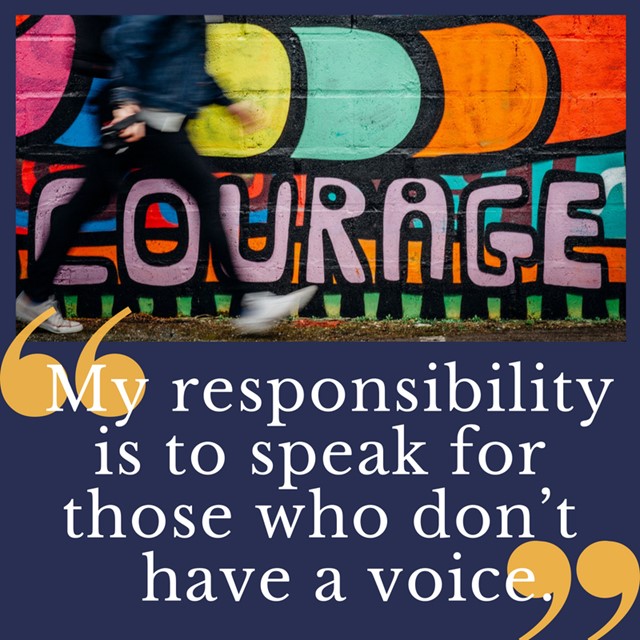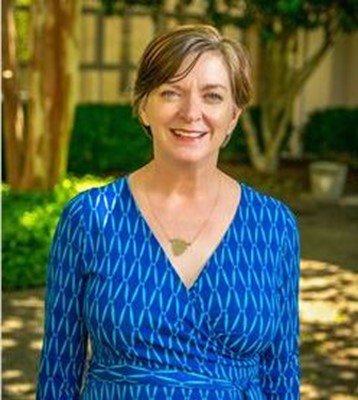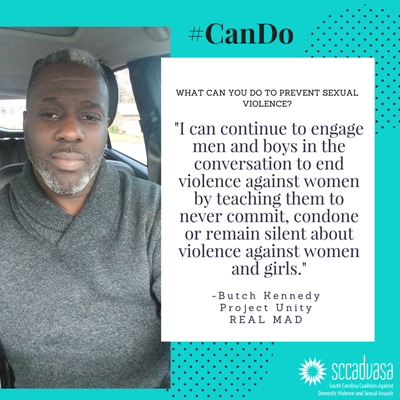
"We all have touchstones that inspire us and we should draw upon those to give meaning to the statistics, stories, and policy changes that inform our advocacy."
– Sara Barber on getting past misgivings about public speaking
Advancing a society where domestic violence and sexual assault aren’t tolerated—that’s Sara Barber’s mission.
She’s executive director of the South Carolina Coalition Against Domestic Violence and Sexual Assault (SCCADVASA), promoting policy changes, awareness, and education in a state where the number of women killed by men is one of the highest in the U.S.
Barber began her career in this field working with offenders—not victims. “Whenever I told people what I did, there was often a long pause before they said ‘I don’t know how you work with those people.’ But for me ‘those people’ are fathers, husbands and sons, wives, daughters and moms.”
 Sara Barber leads a statewide coalition in S.C. to reduce domestic violence and sexual assault
Sara Barber leads a statewide coalition in S.C. to reduce domestic violence and sexual assault
Sara joined SCAADVASA in 2014, because she wanted to play a bigger role in advocacy and policy. In addition to raising awareness at the state level, SCAADVASA provides support to 23 organizations across South Carolina working to support victims and reduce abuse, sexual assault, and human trafficking.
“Domestic and sexual violence are core issues of safety that impact all of us, even if we don’t recognize it, ignore it, or work to distance ourselves from them,” says Sara.
 This SCCADVASA campaign shows how individuals can speak up to reduce violence.
This SCCADVASA campaign shows how individuals can speak up to reduce violence.
Speaking to diverse audiences, making data-based presentations, leading training, and working with the media are all critical parts of her job. We asked Sara to give us some insights:
How does public speaking fit into your work?
The ability to speak to a variety of audiences in a compelling manner is a cornerstone of effective advocacy. In order to inspire people to confront the devastating impacts of sexual and domestic violence within their communities, I have to be able to connect to them and spark their interest in action.
What’s been your toughest speaking challenge and how have you overcome it?
Public speaking has been a path of steps (and missteps) for me. I never thought it was something I would be able to do well and early in my career, I did not know how to overcome that. I thought confidence was born from natural ability.
Since then, I have recognized the importance of preparation and editing and think these are the keys to my success.
What speaking tips do you have for those who want to inspire change?
On the day, I was introduced as the executive director of SCCADVASA, I was given five minutes warning of a television interview. I took a deep breath and recognized that this was my new role and that my responsibility is to speak for those who don’t have a voice.
We all have touchstones that inspire us and we should draw upon those to give meaning to the statistics, stories, and policy changes that inform our advocacy.
What can we do to reduce domestic violence and sexual assault in our communities?
Speak up. These are issues rooted in our culture and our unwillingness to challenge people we may know or admire about their behavior.
Since the explosion of women speaking out began with #metoo, it is no longer possible to deny what thousands of women experience daily—and these were just those who felt comfortable enough to raise their voice.
At SCCADVASA, we have materials and resources that can help build your knowledge and comfort in speaking up. We can also connect you with programs in your community.






